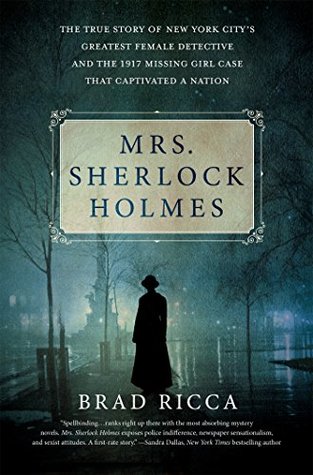Author: Brad Ricca
Synopsis:
Mrs. Sherlock Holmes tells
the incredible true life story of Mrs. Grace Humiston, the New York
lawyer and detective who solved the famous cold case of Ruth Cruger, an
18-year-old girl who disappeared in 1917. Grace was an amazing lawyer
and traveling detective during a time when no women were practicing
these professions. She focused on solving cases no one else wanted and
advocating for innocents. Grace became the first female U.S. District
Attorney and made ground-breaking investigations into modern slavery.
One of Grace's greatest accomplishments was solving the Cruger case after following a trail of corruption that lead from New York to Italy. Her work changed how the country viewed the problem of missing girls. But the victory came with a price when she learned all too well what happens when one woman upstages the entire NYPD.
In the literary tradition of In Cold Blood and The Devil in the White City, Brad Ricca's Mrs. Sherlock Holmes is a true crime tale told in spine-tingling fashion. This story is about a woman whose work was so impressive that the papers gave her the nickname of fiction’s greatest sleuth. With important repercussions in the present about kidnapping, the role of the media, and the truth of crime stories, the great mystery of the book – and its haunting twist ending – is how one woman can become so famous only to disappear completely.
My Thoughts:
I first heard about Mary Grace Quackenbos aka Grace Humsiton in the tv show Timeless. Since the episode called Mrs. Sherlock Holmes was one of my favourites in season two, after I joined the Timeless inspired book club (Lucy Preston Literary Society) on Goodreads it was no question that Brad Ricca's Mrs Sherlock Holmes would be my first read within the community.
Grace Humiston was the first female U.S. district attorney. He worked as a lawyer and detective in the beginning of the 20th century. She became famous for finding the body of a young woman – Ruth Cruger – who had disappeared one chilly winter morning in mysterious circumstances. In truth there is so much more to the story of Grace than the Ruth Cruger case. Brad Ricca guides the reader through her most important cases in his book, keeping the reader at the edge of their seat with his captivating narrative.
While I think the detailed recount of Mrs Humiston's career was extremely fascinating, Mr. Ricca also managed to capture Grace's personality on the pages; he depicted the woman behind the detective persona. She came across as a kind-hearted individual, who didn't only care for the thrill of the chase; the people behind each story and their right to be judged justly was just as important to her. She was always determined and confident in her abilities, she was a strong woman through and through.
The New York of her time was vibrant and colourful, and I could imagine being there myself as I read this book. Its people were still learning how to accept the idea of their city being a giant melting pot and tensions were running high sometimes. I enjoyed the chapter where cases involving the 'little people' were described; Grace helped the poor by giving legal advice, sometimes completely for free.
She fought for immigrant rights and she stood against white slavery. She took on many cases that involved missing girls. She was also against death penalty and she saved a couple of innocent people from the electric chair. The Charles Stielow case was perhaps my favourite of those stories. The chapter 'The Giant and the Chair' was by far the best in the book, I couldn't put my kindle down until I got to the end of it. It was so gripping, I found myself caring for the outcome as much as Grace and her associates did.
The New York of her time was vibrant and colourful, and I could imagine being there myself as I read this book. Its people were still learning how to accept the idea of their city being a giant melting pot and tensions were running high sometimes. I enjoyed the chapter where cases involving the 'little people' were described; Grace helped the poor by giving legal advice, sometimes completely for free.
She fought for immigrant rights and she stood against white slavery. She took on many cases that involved missing girls. She was also against death penalty and she saved a couple of innocent people from the electric chair. The Charles Stielow case was perhaps my favourite of those stories. The chapter 'The Giant and the Chair' was by far the best in the book, I couldn't put my kindle down until I got to the end of it. It was so gripping, I found myself caring for the outcome as much as Grace and her associates did.
As a Hungarian girl I felt really proud that Grace's right-hand man was also Hungarian. Grace and Julius J. Kron were partners for life when it came to fighting crime. If anyone, Kron was her Watson. It was great to get glimpses at how they operated, they were a dynamic duo. After a while they must have been able to read each other's thoughts, they worked so much together.
Brad Ricca's writing is quality. It flows really well and somehow he's able to make you forget that a lot of information is being dumped on you along the way; I was able to absorb all the info and enjoy the stories while I learned about the work of an fascinating historical figure.
I cannot recommend Mrs Sherlock Holmes highly enough. If you like reading about women pioneers as much as I do, this book will be a treat for you.












No comments:
Post a Comment